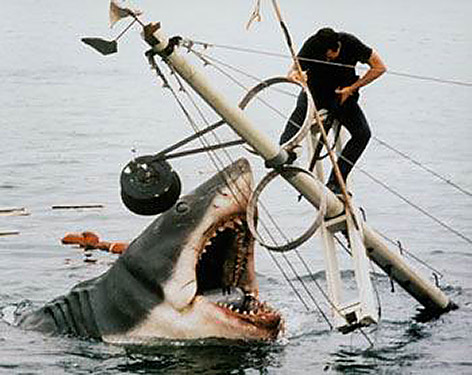

RIP fella
I mean no disrespect to you your family, but my local will be quieter now.
With all the population growth thats good.
The realist's will still go out, chances are miniscule, a chance i will take, not bravado or i am tuff not to be scared, i will be scared at times but accept that its ok.
Also accept that i was not born with gills or flippers so it aint my home.
Start walking sharks and i will be the first to the gun shop you fwits. I suppose they need to able read to heed my warning that would be a big step before they get legs n arms blah blah

What i carnt work out why the Fisheries find it so hard to tag Great Whites if they are trying to use and set up this shark alert system.
Obviously its a complete waste of time unless lots of Gws are tagged.
so
Instead of burrying dead washed up whales, tow them way out to sea anchor them down along the coast in groups of 3 ,4 or 5 off say so when the sharks arrive you can tag them....... ![]()
If they carnt do something like this then large sharks sighted within 1km of the mainstream metro beaches and coast should be removed.
There's lots of misinformation getting around on this thread re shark nets. Again, they are not a barrier they are a local depopulation measure. They exist only to kill sharks. They have worked very well in Queensland where they are used to lower shark populations in the vicinity of popular beaches at a relatively low cost. Yes sharks are caught on both sides of the nets - that's how they work. Yes sharks will appear between the net and the beach - as I said, it is not a barrier.
Video here explains the process quite well.
I recall watching film of the Albany whaling station's chaser ships at work- it showed the harpooned whales being recovered, but being chewed to bits by sharks the whole time.
they had crew at the side of the ship with threeohs blazing away at the sharks.
I heard later (at the whaling museum) that the shark carcasses were recovered as the whale blubber contained in a sharks belly was often worth more than a weeks wages for a crewman!
Now.....If we happen to have a dead whale floating around- why not use it as shark bait?
I know that in the past, our fisheries blokes have towed whale carcasses out to sea and "dispersed them" using Dr Nobels rapidly expanding bait.
If the particular shark we are looking for happened to be next to a rapidly expanding whale...........well......problem solved for the moment![]()
Stephen
So you read that but not the actual stuff that's based in some kind or reality...![]()
This was from Coastalwatch.

